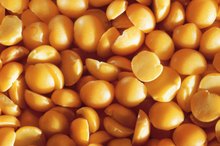Allergy to Pinto Beans
Some unfortunate people have allergic reactions to large groups of related foods, such as dairy products or nuts. In other cases, the triggers for an unpleasant allergic reaction can be very specific. Although it's rare, you might find that you can eat several other varieties of peas and beans but not pinto beans specifically. More often, the allergy includes other legumes.
If you are experiencing serious medical symptoms, seek emergency treatment immediately.
Food Allergy Basics
A food allergy occurs when your body encounters a protein in your food and mistakes it for a threat to your health, such as a virus or bacteria 2. This triggers a response from your immune system, flooding your body with natural defenses including antibodies and histamines. You may notice effects ranging from a mild rash to asthma, difficulty breathing or full-scale anaphylactic shock, which can be fatal.
Peanut Allergy and Beans
Symptoms of Allergies to Chickpeas and Soy
Learn More
Allergies to beans are not common, despite their high levels of protein. However, one legume that's closely related to beans is a major allergen: peanuts. According to UCLA's Food and Drug Allergy Center, approximately 5 percent of people with peanut allergies are also allergic to other legumes. Legume allergies are most common among people of Mediterranean descent.
- Allergies to beans are not common, despite their high levels of protein.
- According to UCLA's Food and Drug Allergy Center, approximately 5 percent of people with peanut allergies are also allergic to other legumes.
Pinto Beans
If you think you've had a reaction to pinto beans, see your doctor for a diagnosis or a referral. Any food allergy should be taken seriously, and it's possible you might be allergic to other legumes. It is also possible that you're having a reaction to an additive or preservative found in a specific brand of canned beans, or that your favorite dish with pintos includes an ingredient you're allergic to. This is why testing is important.
- If you think you've had a reaction to pinto beans, see your doctor for a diagnosis or a referral.
- It is also possible that you're having a reaction to an additive or preservative found in a specific brand of canned beans, or that your favorite dish with pintos includes an ingredient you're allergic to.
Avoidance Strategies
Allergy to Eggplant
Learn More
Pinto beans are tasty and nutritious, but seldom used outside of Mexican and Southwestern cooking. Avoiding restaurant and prepared foods from those traditions will usually limit your exposure to pinto beans. You might also wish to avoid vegetarian restaurants, where beans and legumes of all sorts are widely used for protein. Be wary of soups or dry soup mixes containing beans, as well as any bean dips at a buffet or social occasion.
- Pinto beans are tasty and nutritious, but seldom used outside of Mexican and Southwestern cooking.
- You might also wish to avoid vegetarian restaurants, where beans and legumes of all sorts are widely used for protein.
Related Articles
References
- "On Food and Cooking: The Science and Lore of the Kitchen"; Harold McGee; 2004
- Duke University; Hypoallergenic Legume Crops and Food Allergy: Factors Affecting Feasibility and Risk; John J. Riascos, et al.; 2010
- Beans, pinto, dry. USDA Foods Product Information Sheet. U.S. Department of Agriculture. Published December 2015.
- Perry JR, Ying W. A review of physiological effects of soluble and insoluble dietary fibers. J Nutr Food Sci. 2016;6(2):1000476. doi:10.4172/2155-9600.1000476
- Sanders TA. How important is the relative balance of fat and carbohydrate as sources of energy in relation to health?. Proc Nutr Soc. 2016;75(2):147-53. doi:10.1017/S0029665115004188
- Chávez-Mendoza C, Sánchez E. Bioactive compounds from Mexican varieties of the common bean (phaseolus vulgaris): Implications for health. Molecules. 2017;22(8). doi:10.3390/molecules22081360
- Rebello CJ, Greenway FL, Finley JW. A review of the nutritional value of legumes and their effects on obesity and its related co-morbidities. Obes Rev. 2014;15(5):392-407. doi:10.1111/obr.12144
- McCullough ML, Peterson JJ, Patel R, Jacques PF, Shah R, Dwyer JT. Flavonoid intake and cardiovascular disease mortality in a prospective cohort of US adults. Am J Clin Nutr. 2012;95(2):454-64. doi:10.3945/ajcn.111.016634
- Ha V, Sievenpiper JL, de Souza RJ et al. Effect of dietary pulse intake on established therapeutic lipid targets for cardiovascular risk reduction: A systematic review and meta-analysis of randomized controlled trials. Can Med Assoc J. 2014;186(8):E252-E262. doi:10.1503/cmaj.131727
- Sievenpiper JL, Kendall CW, Esfahani A, et al. Effect of non-oil-seed pulses on glycaemic control: a systematic review and meta-analysis of randomised controlled experimental trials in people with and without diabetes. Diabetologia. 2009;52(8):1479-1495. doi:10.1007/s00125-009-1395-7
- Jacques PF, Cassidy A, Rogers G, Peterson JJ, Meigs JB, Dwyer JT. Higher dietary flavonol intake is associated with lower incidence of type 2 diabetes. J Nutr. 2013;143(9):1474-80. doi:10.3945/jn.113.177212
- Mudryj AN, Yu N, Aukema HM. Nutritional and health benefits of pulses. Appl Physiol Nutr Metab. 2014;39(11):1197-204. doi:10.1139/apnm-2013-0557
- Huang T, Zhang X, Liu C, Lou Y, Song Y. Dietary fiber intake and mortality from all causes, cardiovascular disease, cancer, infectious diseases and others: A meta-analysis of 42 prospective cohort studies with 1,752,848 participants. North Am J Med Sci. 2015;8(2):59-67. doi:10.7156/najms.2015.0802059
- Verma AK, Kumar S, Das M, Dwivedi PD. A comprehensive review of legume allergy. Clin Rev Allergy Immunol. 2013;45(1):30-46. doi:10.1007/s12016-012-8310-6
- Huber K, Brigide P, Bolis Bretas E, Canniatti-Brazaca SG. Phenolic acid, flavonoids and antioxidant activity of common brown beans (Phaseolus vulgaris L.) before and after cooking. J Nutr Food Sci. 2016;6(5):1000551. doi:0.4172/2155-9600.1000551
- Messina V. Nutritional and health benefits of dried beans. Am J Clin Nutr. 2014;100 Suppl 1:437S-42S. doi:10.3945/ajcn.113.071472
Writer Bio
Fred Decker is a trained chef and certified food-safety trainer. Decker wrote for the Saint John, New Brunswick Telegraph-Journal, and has been published in Canada's Hospitality and Foodservice magazine. He's held positions selling computers, insurance and mutual funds, and was educated at Memorial University of Newfoundland and the Northern Alberta Institute of Technology.








